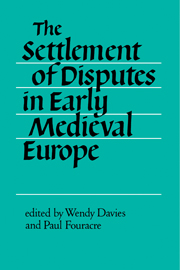Book contents
- Frontmatter
- Contents
- List of figures
- Preface
- Abbreviations
- Introduction
- 1 Disputes in late fifth- and sixth-century Gaul: some problems
- 2 ‘Placita’ and the settlement of disputes in later Merovingian Francia
- 3 Dispute settlement in Carolingian West Francia
- 4 People and places in dispute in ninth-century Brittany
- 5 Visigothic law and regional custom in disputes in early medieval Spain
- 6 Land disputes and their social framework in Lombard–Carolingian Italy, 700–900
- 7 Dispute settlement in the Byzantine provinces in the tenth century
- 8 Charters, law and the settlement of disputes in Anglo-Saxon England
- 9 Dispute settlement in medieval Ireland: a preliminary inquiry
- 10 An early modern postscript: the Sandlaw dispute, 1546
- Conclusion
- Appendix texts of the documents discussed
- Glossary
- List of works cited
- Index
6 - Land disputes and their social framework in Lombard–Carolingian Italy, 700–900
Published online by Cambridge University Press: 11 January 2010
- Frontmatter
- Contents
- List of figures
- Preface
- Abbreviations
- Introduction
- 1 Disputes in late fifth- and sixth-century Gaul: some problems
- 2 ‘Placita’ and the settlement of disputes in later Merovingian Francia
- 3 Dispute settlement in Carolingian West Francia
- 4 People and places in dispute in ninth-century Brittany
- 5 Visigothic law and regional custom in disputes in early medieval Spain
- 6 Land disputes and their social framework in Lombard–Carolingian Italy, 700–900
- 7 Dispute settlement in the Byzantine provinces in the tenth century
- 8 Charters, law and the settlement of disputes in Anglo-Saxon England
- 9 Dispute settlement in medieval Ireland: a preliminary inquiry
- 10 An early modern postscript: the Sandlaw dispute, 1546
- Conclusion
- Appendix texts of the documents discussed
- Glossary
- List of works cited
- Index
Summary
There are about 150 court-cases surviving from the eighth- and ninth-century kingdom of Italy, mostly as originals, in archives throughout the kingdom. Most of them are formal placita, public hearings held by state officials. The fifteen or so others, so-called ‘informal’ cases, were heard under the aegis of unofficial judges which in our documents in practice always means the church. These are often indistinguishable from placita in their procedural norms, and can in large part be assimilated to the public judicial system – they show, that is, the church standing in for the state, rather than the church exercising private judicial powers over its own properties. We can thus use these cases, too, as examples of normal judicial procedures. Churches were the preservers of all the judicial documents we have, in fact, in Italy as elsewhere in Europe. We cannot help this, and it would be scarcely worth mentioning, except in that it explains why churches are almost invariably parties to the cases we have, and almost invariably win: there was no incentive to keep cases they lost. At least one can say that a wide range of churches kept placita; but this general ecclesiastical imbalance must be kept in mind during what follows.
Let us first look at a case of 847, which survives as an original in the archiepiscopal archive in Lucca.
- Type
- Chapter
- Information
- The Settlement of Disputes in Early Medieval Europe , pp. 105 - 124Publisher: Cambridge University PressPrint publication year: 1986
- 14
- Cited by



